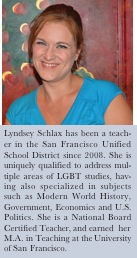 (Editor’s Note: Teacher Lyndsey Schlax of the Ruth Asawa San Francisco School of the Arts recently taught the nation’s first on-site high school LGBT course, according to district officials. She will resume teaching that groundbreaking class next fall. This semester, she is teaching a new Ethnic Studies course. It is a popular elective among the school’s Social Science offerings. In this column, students from her class will be anonymously sharing with the San Francisco Bay Times their thoughts about related matters, and what they are learning.)
(Editor’s Note: Teacher Lyndsey Schlax of the Ruth Asawa San Francisco School of the Arts recently taught the nation’s first on-site high school LGBT course, according to district officials. She will resume teaching that groundbreaking class next fall. This semester, she is teaching a new Ethnic Studies course. It is a popular elective among the school’s Social Science offerings. In this column, students from her class will be anonymously sharing with the San Francisco Bay Times their thoughts about related matters, and what they are learning.)
Student, 12th Grade
Names and the act of immigration have become inextricably linked throughout history. In the U.S., the names of immigrants and their families have repetitively become “Americanized” upon entrance. Many ancestral names were altered to promote assimilation, either unintentionally or purposefully.
During the late 1800s to early 1900s, Ellis Island was the largest immigration station in the country. About 12 million prospective immigrants from all over the world were processed through there. In the effort, though, many families’ and individuals’ names were changed by immigration officers who were too lazy or who misspelled unfamiliar names incorrectly in the crush of people. They ended up spelling names in the American English fashion. The people usually just kept the names as they had been written, starting a new family identity for generations to come in their new home.
People entering the country often Americanized their names on their own, in order to assimilate into society. This occurrence has shifted the identity of many people, generating new verbal and written identities, indicating a new start and a new way of life, but also the partial loss of one’s history and family ties. Such is one aspect of the fabric of this country: the interweaving of loss and gain, coming and going, the past and the future, existing in a delicate balance that we still live in today.
Student, 12th Grade
The name ‘Kyra’ was given to me by my father before birth. He was so set on my name being Kyra that he referred to me as such before my parents could even hold me. He has been surfing for most of his life, and named me after a beach in Australia. Because of its spelling, the name is almost always mispronounced by teachers, doctors and people that read it for the first time.
I remember the initial time someone got it right on the first try was in a summer camp I took after the second grade; this memory is still very vivid to me. I learned never to mind others’ mispronunciation of my name from a young age, but usually the rest of my school class would correct the teacher.
When I was young, I wanted a more common name because I didn’t want to stand out more than I already did. I have met a few other ‘Kyra’s/Kira’s/Keira’s’ in my life, and it seems as though everyone with this name has a strong sense of self; there are no two alike. When I was young, I saw being creative and different as a curse, but I appreciate it now that I am older. My mother always talks about wanting to have named me ‘Olivia,’ or my very Catholic Great Grandmother wanting my name to be ‘Christina.’
According to thinkbabynames.com, “(Kyra) is of Greek origin, and the meaning of Kyra is ‘lord.’ From the male name Kyros, from the Persian and Egyptian word for ‘like Ra, the sun.’ A short form of Kyria, the Greek title of respect for a woman. In Slavonic it means ‘strong woman.’ May also be a Russian name meaning ‘beloved.’” I have also heard from many people that ‘Kyra’ means “killer” in Japanese, but this information comes from a popular anime.
I like to think of myself as a “killer woman” from the different translations of my name.
Recent Comments